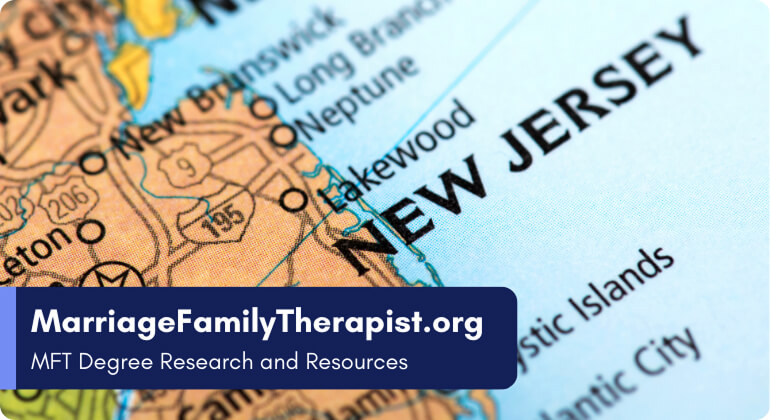Best Marriage & Family Therapy (MFT) Degree Programs in New Jersey 2025
New Jersey offers a variety of Marriage and Family Therapy (MFT) programs, including COAMFTE-accredited options and regionally accredited counseling programs with an MFT specialization. With a growing demand for mental health professionals, LMFTs in New Jersey play a critical role in providing therapy services in private practice, hospital settings, school-based counseling, and community mental health centers.
In this guide
2026 Best Marriage & Family Therapy (MFT) Programs in New Jersey
Kean University
Union, NJ - Public 4-Year - kean.edu
Master's - Marriage and Family Therapy, M.A.
Campus Based - Visit Website
Kean University's M.A. in Marriage and Family Therapy offers a rigorous, integrative training model focused on systemic counseling for licensure. This full-time, three-year campus program requires 57 credits, 300 client contact hours, and 100 supervision hours, using a practitioner-scholar approach to foster cultural sensitivity. Applicants need a 3.0 GPA, 12 behavioral science prerequisite credits, and a departmental interview, with no entrance exam required. The fall application deadline is March 31, and graduates are equipped to handle complex family dynamics and provide ethical interventions in diverse settings, ensuring readiness for professional practice as licensed marriage and family therapists.
- 57 total credit program
- 3-year full-time completion
- 300 client contact hours required
- 100 supervision hours needed
- Fall application deadline: March 31
- Minimum 3.0 GPA required
- Departmental interview required
- Prerequisites: 12 behavioral science credits
- Practitioner-scholar training model
- Preparation for LMFT licensure
Graduate Certificate - Marriage and Family Therapy (M.A.)
Campus Based - Visit Website
Kean University's Marriage and Family Therapy (M.A.) program is a three-year, 57-credit campus-based curriculum that prepares students for state licensure through a multicultural, systemic approach. The program requires 300 client contact hours and 100 supervision hours, emphasizing cultural sensitivity and ethical practice across diverse populations. Students must maintain a minimum 3.0 GPA, complete 12 behavioral science prerequisite credits, and pass a comprehensive final exam. No entrance exam is required for this master's program. Application deadlines are in March, with interviews held in April, and the program follows a practitioner-scholar model to develop advanced clinical skills for counseling individuals, couples, and families.
- Three-year master's program
- 57 total credit hours
- 300 client contact hours
- 100 supervision hours
- Full-time student status
- Minimum 3.0 GPA required
- Fall application deadline: March 31
- Interviews held in April
- State licensure preparation
- Multicultural therapy approach
Other MFT Programs Available in New Jersey
Why Choose an MFT Program in New Jersey?
Strong Mental Health Network
New Jersey has a robust mental health infrastructure, with LMFTs working alongside psychologists, social workers, and psychiatrists to provide comprehensive care to families and individuals. The state’s emphasis on integrated behavioral healthcare ensures that LMFTs are in high demand across multiple therapy settings.
Diverse Clinical Training Opportunities
MFT programs in New Jersey require supervised clinical hours, allowing students to gain practical experience through internships in urban therapy clinics, hospitals, school districts, and private practices. This hands-on training ensures graduates are fully prepared for licensure and real-world counseling roles.
Flexible Program Options
Students can choose from campus-based, hybrid, and fully online programs, making it easier to balance education with professional and personal responsibilities. Many MFT programs also offer accelerated or part-time options, allowing students to customize their learning experience based on their career goals.
New Jersey has several COAMFTE-accredited and regionally approved MFT programs, ensuring students receive rigorous academic training and meet state licensing requirements.
Accredited MFT Programs in New Jersey
Seton Hall University – MA in Marriage and Family Therapy
Seton Hall University offers a COAMFTE-accredited MFT program that prepares students for state licensure and clinical practice. The program includes courses in couples counseling, trauma-informed therapy, and family systems interventions, ensuring students develop comprehensive therapeutic skills.
Montclair State University – MS in Counseling with MFT Specialization
Montclair State University provides a regionally accredited counseling program with an MFT track, allowing students to fulfill licensure requirements while gaining hands-on experience in family counseling. This program is ideal for students interested in both individual and relational therapy.
New Jersey’s Quickest MFT Programs
For students looking to complete their MFT degree in the shortest possible time, New Jersey offers structured graduate programs that integrate clinical training early in the curriculum.
- Seton Hall University’s MA in MFT can be completed in two years for full-time students, with internship placements in clinical therapy settings starting in the second year.
- Kean University’s MFT program follows a 2.5-year model, allowing students to complete coursework and supervised experience concurrently.
- Montclair State University’s MFT specialization can be completed in as little as 2.5 years, with hybrid learning options that provide flexibility for working professionals.
- Online MFT programs from out-of-state institutions allow New Jersey students to complete coursework at an accelerated pace while completing required clinical hours locally.
New Jersey’s Cheapest MFT Programs
For students seeking cost-effective MFT programs, New Jersey offers a mix of public and private institutions with competitive tuition rates.
- Kean University offers one of the most affordable in-state MFT programs, with lower tuition costs compared to private universities.
- Montclair State University provides financial aid, scholarships, and assistantships, reducing the overall cost of earning an MFT degree.
- Seton Hall University offers tuition assistance and employer reimbursement programs, making it a viable choice for students seeking financial aid options.
- Loan forgiveness programs for LMFTs working in underserved areas help offset education costs, making therapy careers more accessible in community-based settings.
For students prioritizing affordability, exploring state-funded tuition assistance, financial aid opportunities, and employer-sponsored education benefits is highly recommended.
How to Become Licensed as an LMFT in New Jersey
1. Earn a Master’s or Doctorate in Marriage and Family Therapy
- Complete an MFT or related mental health graduate program that meets New Jersey’s licensure requirements.
- Choose a COAMFTE-accredited program or a regionally accredited MFT track to ensure eligibility for licensure.
2. Complete 3,000 Hours of Supervised Clinical Experience
- Gain post-graduate clinical hours, including 1,500 direct client contact hours under the supervision of a licensed MFT or other mental health professional.
- Work in approved settings, such as community counseling centers, private practices, or hospitals to meet New Jersey’s experience requirements.
3. Pass the National MFT Examination
- Take and pass the Association of Marital and Family Therapy Regulatory Boards (AMFTRB) National MFT Exam.
- Demonstrate competency in clinical skills, ethical practice, and therapy techniques required for professional practice.
4. Apply for Licensure Through the New Jersey State Board of Marriage and Family Therapy Examiners
- Submit official transcripts, proof of supervised experience, and national exam scores for licensure approval.
- Complete any additional New Jersey-specific licensing requirements, including coursework verification and background checks.
5. Maintain Licensure with Continuing Education
- Complete 40 continuing education (CE) hours every two years, including coursework in ethics, cultural competency, and specialized therapy techniques.
- Attend professional development workshops and online training programs to stay current in the field.
LMFT Career & Salary Outlook in New Jersey
New Jersey’s mental health field continues to grow, with LMFTs playing a key role in expanding therapy services for families and individuals. The average salary for LMFTs in New Jersey is $70,800 per year, with experienced professionals earning over $100,000 annually.
Where LMFTs Work in New Jersey
- Private practices and mental health clinics offer higher salaries and flexible schedules for LMFTs.
- Hospital-based therapy programs provide job stability and access to integrated behavioral healthcare teams.
- School-based mental health services allow LMFTs to work with children and adolescents in educational settings.
- Teletherapy services are growing, allowing LMFTs to serve clients remotely across the state.
With strong salary potential and growing job opportunities, New Jersey remains an excellent location for LMFTs to build a rewarding career in mental health counseling.
New Jersey provides a range of accredited MFT programs, structured licensure pathways, and diverse career opportunities for licensed therapists. With flexible learning formats, financial aid options, and strong employer demand, the state is an ideal place for students pursuing careers in marriage and family therapy.
For students seeking a high-quality, cost-effective, and career-focused MFT education, New Jersey’s programs prepare graduates with the clinical experience, licensure support, and professional credentials necessary to succeed in private practice, community therapy, and behavioral health settings.


Related Articles
- MFT Doctorate Degrees: DMFT vs PhD – Who Should Pursue Each Path?
- LMFT vs MFT: Is Licensure Necessary for Your Therapy Career?
- Support That Affirms: Navigating Mental Health as LGBTQ+
- The ROI of an MFT Degree: Analyzing the Financial Investment in Your Therapy Career
- From Student to Therapist: What to Expect in Your MFT Clinical Internship
- Who Will You Treat as a Marriage & Family Therapist? A Career Guide for Aspiring MFTs